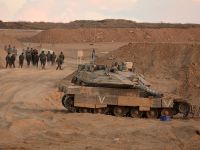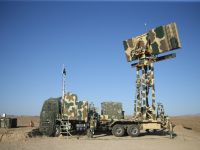By Munir K. Nasser
Chief Correspondent, Washington, DC
Albawaba.com
Chief Palestinian negotiator Saeb Erekat challenged Israeli Deputy Defense Minister Ephraim Sneh to pull out his troops from Palestinian flashpoints, and accept an international commission of inquiry before peace negotiations can resume.
Erekat was addressing Sneh face to face on a special American television town meeting broadcast from Jerusalem on ABC news network on Tuesday. Other panelists participating in the program included Palestinian Legislative Council member Hanan Ashrawi, Knesset Arab member Azmi Bishara, Knesset Deputy Speaker Naomi Chazan, and Jerusalem Mayor Ehud Olmert. The 90-minute program Nightline was hosted by ABC news personality Ted Koppel.
Addressing his comment to the Israeli Deputy Defense Minster, Erekat called on him to take his soldiers outside the entrances of all villages, towns and refugee camps.
“We urge him to stop using the language of intimidation and ultimatums; unfortunately, today the voices of guns, tanks, choppers, are really destroying the essence of any hope. The massacre must stop. We need to stop the killing fields out there,” he said.
Erekat challenged Sneh to accept a commission of international inquiry to come and be stationed at the entrances of villages, towns and refugee camps. “We really think that if these people emerge, they can tell you who is responsible and what went wrong. The voices of people who are trying to negotiate are as low as they have been silenced by the voices of guns, choppers, and tanks. This must stop, Mr. Sneh. I appeal to you, to stop the use of force. I appeal to you to take your kids from the entrances of Palestinian villages and towns. What are your soldiers doing there?” he said.
In his response, Sneh alleged that the Palestinians would never find a better partner for peace than the Barak government. “We won’t resume the talks now,” he said. “When we sit at the negotiating table, we talk as equals. The moment you start the violence, our strength becomes our weakness. Now you gain the sympathy of the world. You want to internationalize the conflict to bring the UN and the French and the Germans. Why don’t you speak directly, face to face with us?” Sneh said.
Hanan Ashrawi seconded Erekat’s call for an international inquiry, stressing that such an inquiry is very important because for the first time in its history, Israel has to be held accountable and has to abide by international law.
“Historically, Israel has been treated as a country above the law and beyond accountability and never have been investigated and all the massacres that took place against the Palestinians were a domestic investigation, but we are not an internal Israeli issue. We need protection for the Palestinians and we need the rule of law that is global. Israel has to be brought within the fold of nations whereby it will live by the same standards and norms of civilized behavior.
Addressing Sneh, Ashrawi said that she was dressed in black today, “because your army, as an occupation army has shot and killed a 100 Palestinian people. You cannot shoot our children and get away with it. I haven’t seen anything more racist in my life. We are in suffering; we are in pain, and you have lost touch with the human essence. What brings you to Palestine? Why do you insist on being an occupation army? Even in the midst of negotiations, you bring your weapons and your soldiers to Palestine and you protest; when we die we protest, and when you attack us we resist. We want to live. I have never seen such a morally distorted logic in my life,” Ashrawi said.
Ashrawi appealed to Sneh to issue orders to his army to stop killing the children, and stop using live ammunition. “You take your tanks away from Jerusalem, that’s why it is an occupied city. You take away your settlers who are shooting at innocent civilians and people in their homes. The real issue is you haven’t got rid of the mentality of the occupiers. Nobody gave you the God-given right to enslave a whole nation and to kill our people. We gave you a majority of our land. All of Palestine was ours. Now we are willing to accept 22 percent of Palestine. Israel was created on Palestinian land in 1948.”
Arab Knesset Azmi Bishara described in detail the attacks by Israeli mobs on his house in Nazareth last week in order to burn it down despite his parliamentary immunity.
Jerusalem Mayor Olmert accused Bishara of “excessive abuse of his immunity by siding with Israel’s enemies,” including the Lebanese resistance movement Hizbollah. Bishara stressed that “Hizbollah is a legitimate resistance movement” which has the right to fight for liberating its country from occupation.
Bishara told his American television audiences that Barak’s policies are not that much different from those of his predecessor, Benjamin Netanyahu.
“The only change that Barak did is in rhetoric and political discourse, but in reality Barak built what Netanyahu could not build, including Jabal abu Ghneim in Jerusalem. Israel did not accept the historical conditions for peace with the Palestinians. You want to dictate on the Arabs what Netanyahu could not dictate. You can’t do that with tanks and helicopters against children. You cannot dictate an unjust peace. You have to accept the elements of justice in peace,” said Bishara.
Naomi Chazan, Knesset Deputy Speaker, reflected the position of the Israeli peace movement by appealing to both sides to work together on achieving peace.
“We are closer today to an understanding than we have ever been before on the basic historical questions. It is very conceivable that we have gotten ourselves into a game for trying to play for international backing and legitimacy and instead of having the courage to take the next step. We are talking for the first time, on the Israeli side, about two capitals, for two states, in the city of Jerusalem. An end to the conflict will not be achieved without a viable Palestinian state, which cannot be achieved without an end to the conflict.”
Chazan said with an emotional voice that the bottom line is that a 100 people have been killed and thousands have been injured.
“This cannot continue. The worst thing that we can make is to get in the blame game. I am sad and I am angry; and I am disappointed and I am confused; and I have to answer to the millions of people who belong to the peace movement and I have to tell them with some conviction that we have a partner still, despite what happened. The critical question is how to pick up the pieces when trust is broken down?”
One of the most emotional moments of the program came when Koppel invited a Jewish teenage girl whose Palestinian friend had been shot dead by Israeli forces in an Arab village inside Israel last week.
''Are we really trying not to kill anyone? I wonder how a 17-year old would be a threat to Israeli soldiers?'' she exclaimed, addressing Sneh.
The killing has been a front-page story in Israel and abroad because the 17-year-old boy had been involved in multiethnic programs run by the Seeds for Peace organization. Sneh, clearly uncomfortable, answered, ''I don't know a single Israeli soldier who wants to kill a child.''
The Nightline town meeting, which was pre-taped at east Jerusalem's YMCA, was delayed nearly three hours, after Sneh and Olmert refused to ask their bodyguards to leave their weaponry outside the hall. Bishop Riah Abu el-Assel, head of the Anglican Diocese of Jerusalem, which runs the YMCA, informed the six guests that no arms had been allowed into the building for 50 years under a strict diocesan rule. The Israeli side agreed after lengthy negotiations with Koppel to leave their weapons outside the hall.
© 2000 Al Bawaba (www.albawaba.com)







